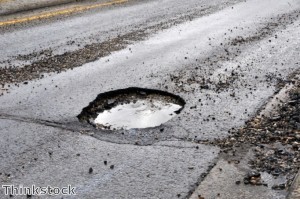Protecting a car's tyres against the UK's pothole epidemic
11/02/2013 16:38
Share

Protecting a car's tyres against the UK's pothole epidemic
The UK's problem with potholes continues to be a burden on drivers, with a well-known tyre safety organisation providing some tips on how to act should a car's tyres collide with a hazardous defect in the road.
TyreSafe is aiming to cut the severity of the headaches motorists have to endure after striking a pothole, following the release of new research by consumer watchdog Which?
According to this study, councils across England and Wales had to shell out £22.8 million in compensation during 2012 alone to drivers who had complained about pothole related damage to their vehicles.
Looking into this statistic, Stuart Jackson, chairman of TyreSafe, said: "Hitting a pothole can cause a number of tyre and wheel problems which can have a serious impact on road safety.
"Visible damage such as buckled wheels or lumps in the tyre are the most obvious signs of a problem which must be addressed by a qualified professional. However, hidden problems such as cracked alloys can be just as dangerous."
With this in mind, Mr Jackson advises that motorists monitor their vehicle's tyre pressures in the few days after a vehicle has struck a pothole. Even a gradual loss in pressure should set alarm bells ringing.
This is because correct air pressure is crucial for assuring safe driving. Tyres found to have low pressure have a detrimental effect on the car's handling and corning, while the tyres themselves are more likely to overheat and suffer from rapid deflation when put through this strain for sustained periods.
On top of this, hairline fractures in the alloy wheel should also be looked for. This is due to the fact that even the faintest of damage to this part of a car can lead to air escaping from a tyre by the bucket-load.
"If you are in any doubt about the condition of your wheels and tyres, we'd advise popping along to your nearest tyre retailer so they can give them a thorough inspection and make sure they're safe to use," the expert concluded.
Posted by Craig Salter
